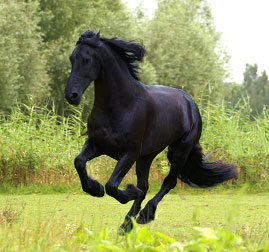
The horse “flies across the landscape with thundering hooves as if to run out of its own skin for the love of freedom.”
(The Book of Symbols)
Equines* have an evolutionary history dating back 50 million years, and ancient cave paintings indicate that these magnificent beings have been important to humans ever since the Stone Age. Through our travels, wars, adventures, and conquests, they have been alongside us each step of the way. Today, they not only partner with us in sport and recreation, they are also our partners in emotional growth and healing. In fact, horses and donkeys have a great deal to teach us about modern living and how we can become our best selves.
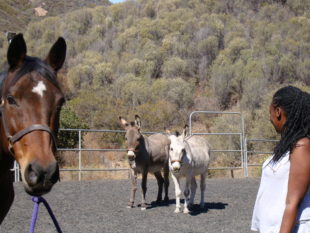 Unlike humans, equines are prey animals. Instinctively, as prey animals, their survival depends on their ability to sense underlying energetic and emotional currents in their environment. They use their animal wisdom – keen sense of smell, hearing, body awareness, and vigilance – to keep themselves safe. You could call equines ‘Masters of Mindfulness,’ because they are fully in the present moment, have no judgment, and don’t hold on to the past or project into the future. Furthermore, they are completely congruent and authentic with what they experience – in other words, what they show on the outside matches what they feel on the inside. They don’t deny or mask their feelings and our masks/personas do not fool them.
Unlike humans, equines are prey animals. Instinctively, as prey animals, their survival depends on their ability to sense underlying energetic and emotional currents in their environment. They use their animal wisdom – keen sense of smell, hearing, body awareness, and vigilance – to keep themselves safe. You could call equines ‘Masters of Mindfulness,’ because they are fully in the present moment, have no judgment, and don’t hold on to the past or project into the future. Furthermore, they are completely congruent and authentic with what they experience – in other words, what they show on the outside matches what they feel on the inside. They don’t deny or mask their feelings and our masks/personas do not fool them.
We often say that horses and donkeys are like living, breathing biofeedback machines with a heart and a soul. Their keen awareness of, and ability to interpret, the body language and emotions of the animals around them not only makes them successful herd animals but enables them to be steadfast interpreters of our underlying, true feelings. They are powerful messengers that mirror back their direct experience of us humans. And, they do so without the judgment or biases typically associated with human beings.
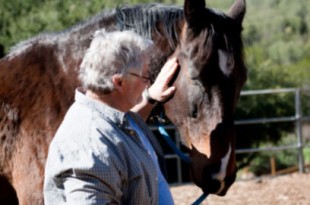
Because they are fully present and without agenda or judgment, they invite us to be the same, and this is where the deepest and most effective work transpires.
Because the means of achieving strong, healthy relationships are similar among humans and equines, interacting with them can help us develop strong, effective relationship skills. For instance, trust and respect are vital elements of the human-equine bond. Interacting with equines for growth and learning allows participants to test out how they are experienced and learn clear and effective ways of building trust and gaining respect.
Equines are also masters at teaching leadership. They must know that you are worthy of the responsibility of leadership and that you will guide them in the right direction, avoiding danger or harm, while simultaneously providing comfort and tranquility; you must have the wisdom of a true leader. Even if you aren’t a typical leader, the skills gained by working with horses and donkeys help participants build confidence, mindfulness, and emotional intelligence.
Like humans, equines are herd animals and rely on each other for safety and survival. And, just like us, they have complex social dynamics. Every herd has a dominance hierarchy, or pecking order, and each member has a position. Although the leaders are important, each member of the herd plays an integral role in the cohesion and prosperity of the herd itself. It is precisely this herd mentality, the need for cooperation, teamwork and loyalty, that tends to draw humans toward equines in search of companionship.
While horses and donkeys share many of the same characteristics, there are some important differences which make donkeys an ideal complement to horses for Equine Assisted Growth, Learning, and Psychotherapy:
Horses
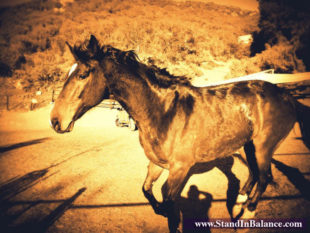 Horses depend on flight as their primary means of survival. When threatened their first response is to flee, but they will fight if needed. Most often, a herd of horses is led by an alpha mare. She is responsible for guiding the herd to food, water, shelter and safety. There is also a stallion (or dominant male in domestic herds) that sire’s the herd’s offspring and is responsible for keeping intruders and predators away. As the herd travels, the alpha female leads the way and the stallion brings up the rear, keeping the herd moving forward and protecting them from attack.
Horses depend on flight as their primary means of survival. When threatened their first response is to flee, but they will fight if needed. Most often, a herd of horses is led by an alpha mare. She is responsible for guiding the herd to food, water, shelter and safety. There is also a stallion (or dominant male in domestic herds) that sire’s the herd’s offspring and is responsible for keeping intruders and predators away. As the herd travels, the alpha female leads the way and the stallion brings up the rear, keeping the herd moving forward and protecting them from attack.
By clearly and consistently enforcing and reinforcing the social rules, the dominant mare and stallion secure their position and maintain comfort and peace within the herd. Dominance in this sense is not related to the physical stature or aggressiveness of a horse; the alpha female it is not the “biggest and the baddest” horse in the herd. Rather, she demonstrates her worthiness to lead the herd through wisdom, clear communication, and coherent energy. These are the same qualities that are necessary for effective influence and leadership in human “herds.”
Donkeys
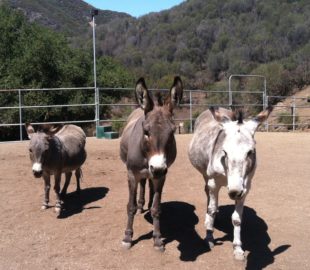 Unlike horses, donkeys (also called burros) do not typically run when faced with something strange or scary. Because they are adapted to dry desert lands and steep rocky areas they are very sure footed. When faced with a threat or uncertainty their instinct is to stand still and assess the situation — they are thinkers rather than runners. For this reason they are often called stubborn, but actually they are just exhibiting common sense! They think and learn differently than horses. You can not force or frighten a donkey into doing something, you have to gain their confidence and respect. Once you have earned their trust, they become willing and dependable partners. They are excellent teachers of calm, caring, and clear leadership.
Unlike horses, donkeys (also called burros) do not typically run when faced with something strange or scary. Because they are adapted to dry desert lands and steep rocky areas they are very sure footed. When faced with a threat or uncertainty their instinct is to stand still and assess the situation — they are thinkers rather than runners. For this reason they are often called stubborn, but actually they are just exhibiting common sense! They think and learn differently than horses. You can not force or frighten a donkey into doing something, you have to gain their confidence and respect. Once you have earned their trust, they become willing and dependable partners. They are excellent teachers of calm, caring, and clear leadership.
While social relationships are very important to donkeys, they do not have the same dominance hierarchy as horses do. A wild herd of donkeys is typically lead by one jack (male donkey) and consists of several jennies (female donkeys). While they have a clear leader, their herd structure is not as closed or strict as that of horses; wild herds will often break up and reform with new members. This is another reason why mutual respect and partnership versus dominance is important to donkeys.
As the only prey animals that have a true partnership with humans, equines occupy an unparalleled position in our lives and provide us with unique opportunities to develop and refine the skills we need to be successful and happy in life. Whether engaged in individual or group activities, participants in our equine interactive programs work on things such as self-awareness, clear communication, relationship dynamics, teamwork, assertiveness, trust, frustration tolerance, boundaries, and confidence.
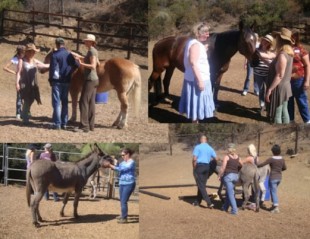
Horses and donkeys intuit our emotional states and respond accordingly, and therefore we learn the most valuable of lessons: by changing ourselves, the world around us can change.
*Equines refers to horses and donkeys. Although zebras are also part of the Equine family, they have not been domesticated like horses and donkeys and do not have the same level of partnership.

Excellent explanation of how horses are so important in helping humans, the ultimate predator, learn how to be an effective leader in any situation. This is a study worth participating in, worth following, worth mastering.